Key Takeaways
- Adopting a Savannah cat can cost anywhere from $1,500 to $20,000 depending on the generation and breeder.
- Savannah cats require ongoing expenses for healthcare, high-protein food, and enrichment toys.
- These cats are legal in most U.S. states, but some have restrictions or require permits.
- Savannah cats are highly active and require ample space and stimulation to thrive.
- While they can be great pets, they might not be suitable for homes with small children or other pets.
Understanding Savannah Cat Adoption Costs
Bringing a Savannah cat into your home is a significant commitment, both emotionally and financially. These exotic felines, known for their striking appearance and unique lineage, come with a price tag that reflects their rarity and appeal. It’s crucial to understand the costs involved to ensure you’re prepared for the responsibility.
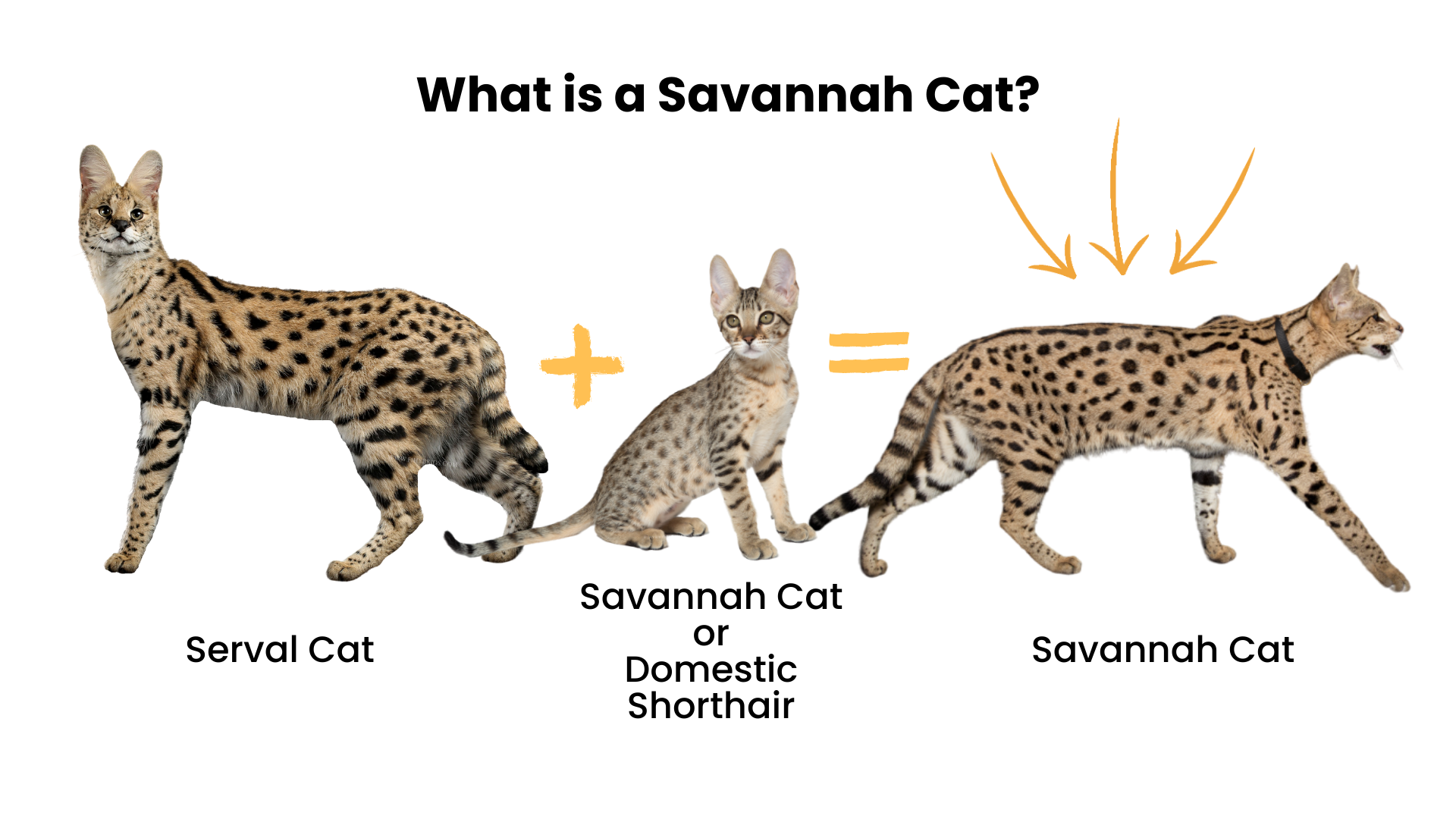
“Savannah Cat | Size,Diet,Personality,Price” from www.f1hybridssavannahcats.com and used with no modifications.
Initial Purchase Price and Variations
The initial cost of adopting a Savannah cat can vary greatly. Prices typically range from $1,500 to $20,000. This variation is largely dependent on the cat’s generation. Savannah cats are categorized by filial generations, ranging from F1 to F5, with F1 being the closest to their wild Serval ancestors.
F1 Savannahs, being 50% Serval, are the most expensive due to their rarity and the challenges involved in breeding them. They can cost upwards of $20,000. As you move to later generations like F3, F4, and F5, the price tends to decrease, with these cats being more domesticated and generally more affordable, often priced between $1,500 and $5,000.
- F1 Savannah: $10,000 – $20,000
- F2 Savannah: $5,000 – $10,000
- F3 Savannah: $2,000 – $5,000
- F4 and F5 Savannah: $1,500 – $3,000
It’s important to purchase from a reputable breeder who can provide health guarantees and proper documentation. This ensures that your Savannah cat is healthy and well-socialized.
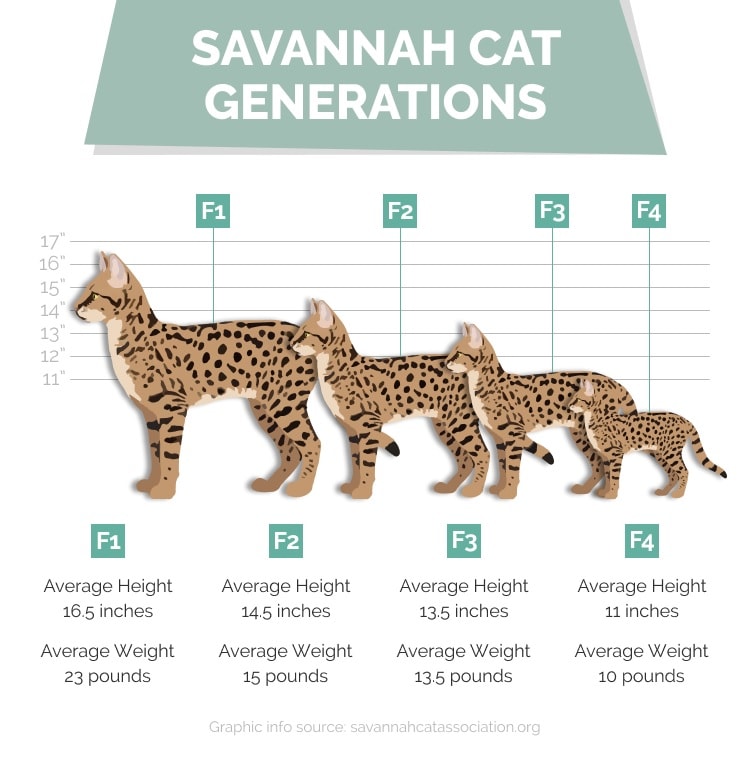
“F1 vs. F2 Savannah Cat: How Are They …” from www.catster.com and used with no modifications.
Ongoing Costs: Healthcare, Food, and Accessories
Beyond the initial purchase, Savannah cats require ongoing investment to maintain their health and happiness. These cats have specific dietary needs, often requiring a high-protein diet similar to their wild ancestors. Premium cat foods or raw diets can be costly but are necessary to meet their nutritional requirements. For those considering adopting other unique breeds, the Lykoi cat also has specific care requirements that potential owners should be aware of.
Budgeting for a Savannah Cat: What to Expect
When budgeting for a Savannah cat, it’s essential to consider all aspects of their care. Here’s a breakdown of what you might expect annually:
- Food: $500 – $1,000
- Veterinary Care: $200 – $500
- Toys and Enrichment: $100 – $300
- Insurance: $200 – $400
These estimates can vary based on your location and the specific needs of your cat. Regular veterinary check-ups and maintaining a stimulating environment are crucial for keeping your Savannah cat healthy and happy.
Are Savannah Cats Good House Pets?
Savannah cats are undeniably captivating, with their exotic looks and engaging personalities. However, whether they make good house pets depends largely on your lifestyle and ability to meet their needs. They are not your average house cat, and understanding their behavior and requirements is key to a successful adoption.
- Savannah cats are highly active and require plenty of physical and mental stimulation.
- They form strong bonds with their owners and can be very affectionate.
- These cats are known for their intelligence and curiosity, which can sometimes lead to mischief.
Personality Traits of Savannah Cats
Savannah cats are renowned for their vibrant personalities. They are incredibly energetic and often compared to dogs in terms of their playfulness and loyalty. Many owners find them to be affectionate companions who enjoy being part of family activities. However, their high energy levels mean they need plenty of exercise and interactive play to prevent boredom and behavioral issues. For more information, you can explore whether a Savannah cat is a good pet and understand their unique needs.

“This is a Savannah cat, the largest …” from www.reddit.com and used with no modifications.
Household Compatibility: Space and Activity Needs
Before bringing a Savannah cat into your home, consider the environment you can provide. These cats thrive in homes where they have plenty of space to explore and play. They love climbing and jumping, so cat trees and perches are highly recommended. Because of their active nature, a home with access to a secure outdoor space or a large indoor area is ideal.
In conclusion, while Savannah cats can make excellent pets, they require a dedicated owner who can cater to their unique needs. If you have the time, space, and resources, they can be a rewarding addition to your family. For those interested in other feline companions, consider exploring the Maine Coon cat adoption guide for a different experience.
US Legalities Surrounding Savannah Cats
Before you fall in love with the idea of adopting a Savannah cat, it’s crucial to understand the legalities surrounding their ownership. Laws can vary significantly from state to state, and even within counties, affecting whether you can legally own one of these exotic felines.
State Laws and Regulations
In the United States, the legality of owning a Savannah cat depends on local laws. Some states have no restrictions, while others have specific rules regarding the ownership of hybrid animals. For instance, states like Texas and Florida allow Savannah cats without any special permits. However, states such as Hawaii and Georgia have banned them altogether due to their wild ancestry.
It’s essential to check the regulations in your state and county before proceeding with adoption. Contact your local animal control or wildlife department for detailed information to ensure compliance with all legal requirements.
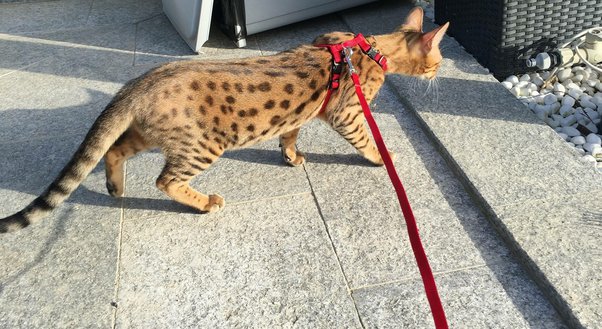
“Savannah cat as a pet …” from www.quora.com and used with no modifications.
Permit Requirements and Potential Restrictions
Owning a Savannah cat may require special permits, depending on where you live. Some states classify them as exotic animals, necessitating permits to ensure responsible ownership. For example, in New York, owning an F1 Savannah cat requires a permit due to their closer genetic link to wild Servals. Later generations, like F4 and F5, are often exempt from such requirements.
It’s essential to verify these requirements well in advance. Obtaining a permit can be a lengthy process involving paperwork, fees, and inspections. Furthermore, failure to comply with local laws can result in fines or the confiscation of your pet, so thorough research is critical.
What Makes Savannah Cats Special and Different?
Savannah cats stand out due to their unique heritage and striking appearance. They are a hybrid breed, originating from the crossbreeding of an African Serval and a domestic cat. This gives them a distinct set of traits that set them apart from other domestic cats.
Their wild ancestry contributes to their adventurous and curious nature. This makes them more active and engaging than many other cat breeds. Additionally, their appearance, characterized by long legs, large ears, and a sleek coat with bold spots, gives them a wild and exotic look. Learn more about whether a Savannah cat is a good pet for you.
- They are known for their loyalty and can form strong bonds with their owners.
- Highly intelligent, they can be trained to perform tricks and walk on a leash.
- They have a playful demeanor and enjoy interactive games and activities.
The combination of these traits makes Savannah cats a unique choice for those looking for a pet that is both beautiful and engaging. However, their high energy levels and need for stimulation mean they require an owner who can match their enthusiasm and provide ample enrichment. For those interested in unique cat breeds, the Lykoi cat offers another fascinating option.
For those who can meet these needs, Savannah cats offer a rewarding and dynamic pet experience that few other breeds can match.
Unique Traits Derived from the African Serval
One of the most fascinating aspects of Savannah cats is their lineage. The African Serval, a medium-sized wild cat native to Africa, is known for its striking appearance and remarkable hunting skills. Savannah cats inherit many of these traits, which contribute to their unique appeal.
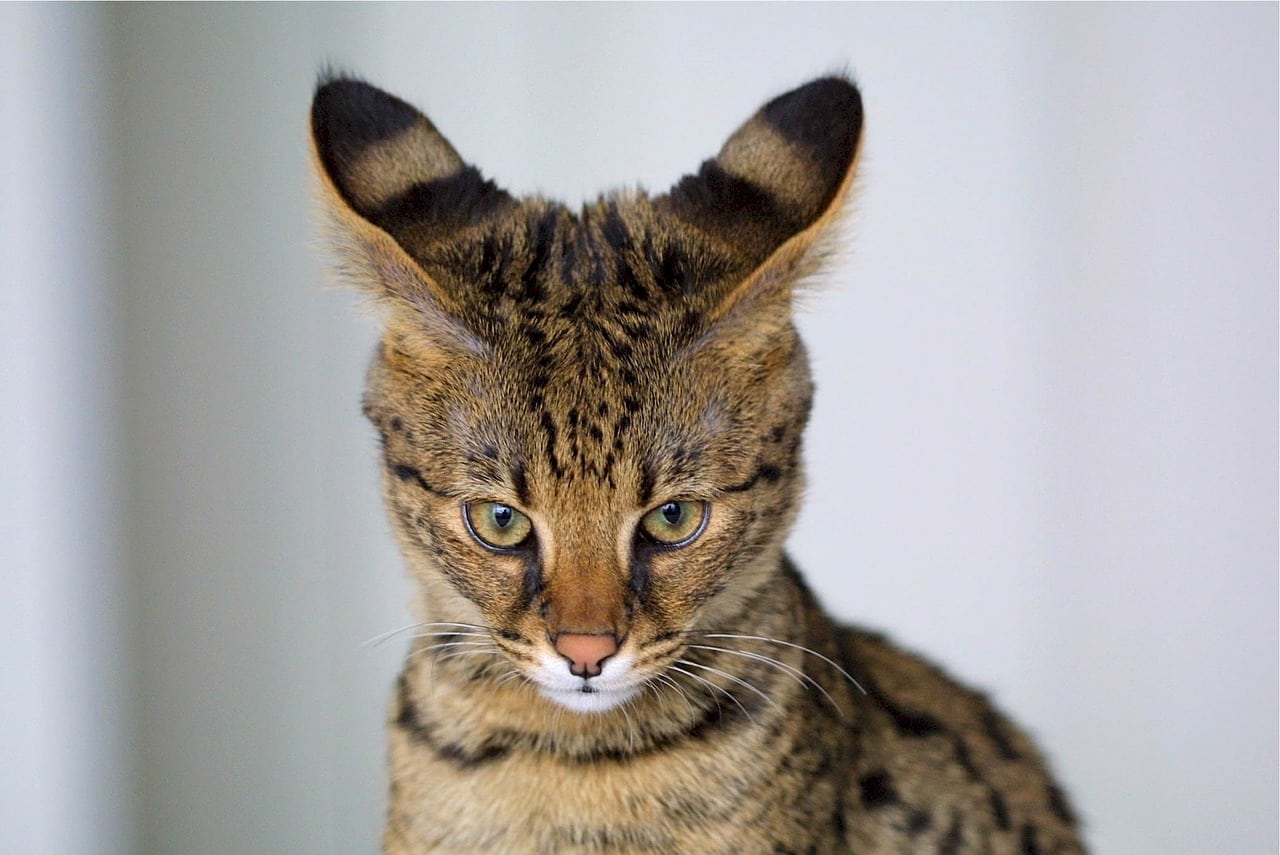
“10 Surprising Facts About Savannah Cats …” from www.rover.com and used with no modifications.
Physical Appearance and Characteristics
Physically, Savannah cats are a blend of their wild and domestic heritage. They possess long, slender bodies and large, upright ears that give them an alert and regal appearance. Their coats are short and sleek, often featuring bold spots and stripes reminiscent of their Serval ancestors.
Their eyes, which can range from green to gold, add to their exotic allure. They are also known for their athleticism and agility, traits that serve them well in active households. This combination of physical attributes makes them a standout choice for those seeking a pet with a wild touch.
Pros and Cons of Owning a Savannah Cat
Before deciding to adopt a Savannah cat, it’s important to weigh the pros and cons. While they offer a unique pet experience, they also come with challenges that potential owners must consider.
Benefits of Having a Savannah Cat as a Pet
Savannah cats bring a host of benefits to their owners. Their intelligence and playful nature make them highly entertaining companions. They are known for their loyalty and can form deep bonds with their human families. Additionally, their exotic appearance is a constant source of fascination and admiration, similar to the appeal of the Maine Coon cat.
Many owners find joy in training their Savannah cats to perform tricks or accompany them on walks. Their social nature means they often enjoy being the center of attention and can be a lively addition to any household.
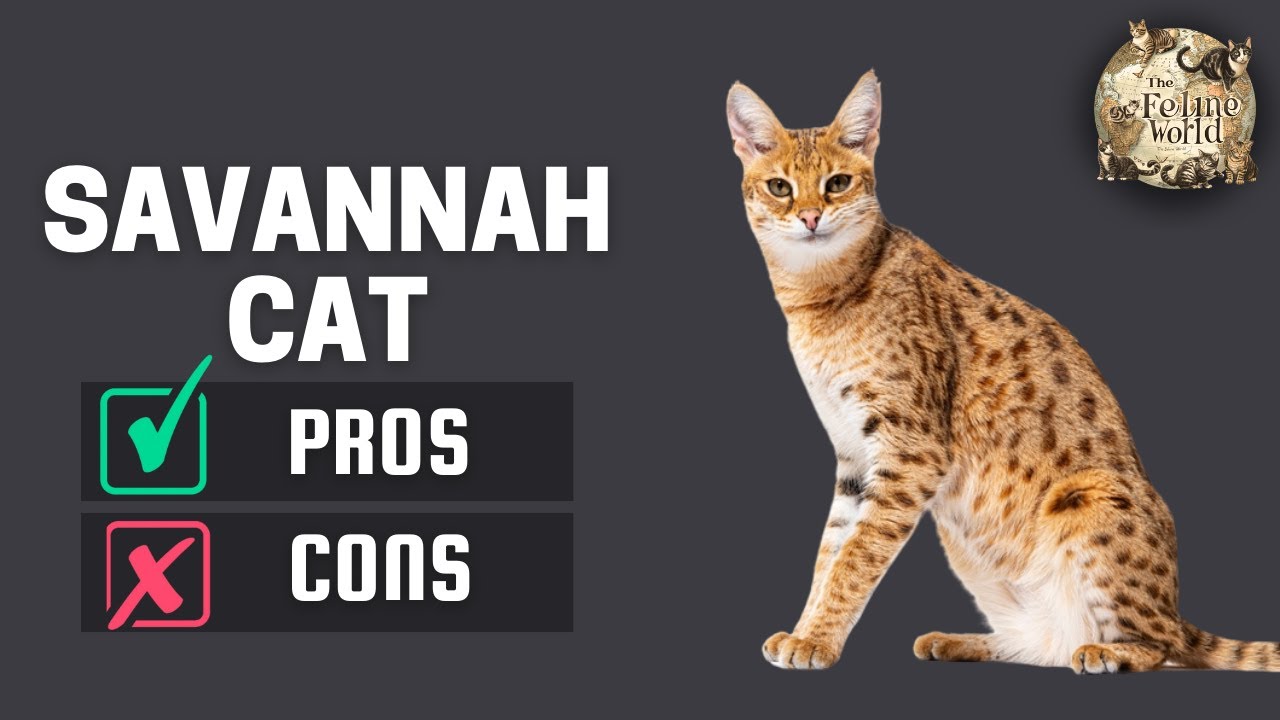
“Savannah Cat: The Pros & Cons Of Owning …” from www.youtube.com and used with no modifications.
Challenges and Considerations for Owners
However, owning a Savannah cat is not without its challenges. Their high energy levels require regular exercise and mental stimulation to prevent boredom and destructive behavior. They can also be more demanding in terms of care and attention compared to other breeds. For those interested in unique cat breeds, exploring the Lykoi wolf cat might also be worthwhile.
Moreover, their exotic nature can sometimes lead to issues with local laws and regulations, as discussed earlier. Potential owners must be prepared to navigate these challenges and commit to providing the care and environment that Savannah cats need to thrive.
Savannah Cats With Kids and Other Pets
When considering a Savannah cat, it’s important to think about how they will fit into your household, especially if you have children or other pets. These cats can be wonderful companions, but their interactions with kids and other animals require careful management. For a comprehensive understanding of how Savannah cats compare to other breeds, you might find this Maine Coon cat adoption guide insightful.
Savannah cats are generally friendly and sociable, but their high energy levels mean they may not be suitable for very young children. They can sometimes play rough, and their size and strength might be overwhelming for small kids. For more information on whether a Savannah cat is a good pet, check out this detailed guide.
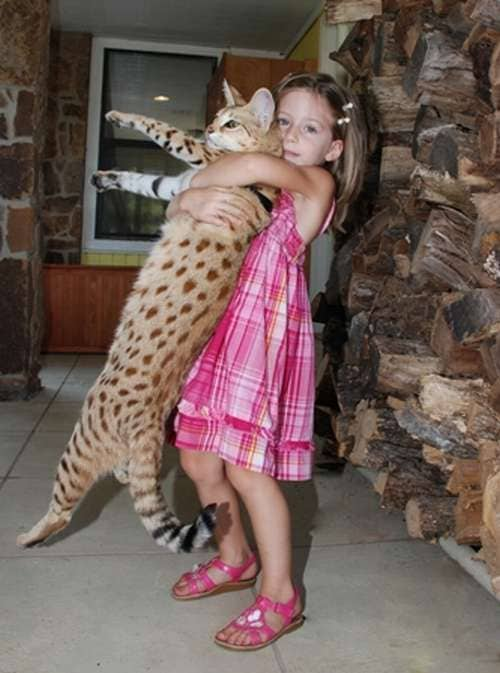
“Supersized House Pets: Giant Savannah …” from www.trendhunter.com and used with no modifications.
Compatibility with Children under 12
For families with children under 12, it’s essential to teach kids how to interact appropriately with a Savannah cat (not like the girl featured above). Supervised playtime can help ensure that both the cat and the children have positive experiences. It’s also important to set boundaries to prevent any accidental injuries during play. For more insights on unique feline breeds, explore the Lykoi wolf cat adoption guide.
How Savannah Cats Interact with Other Cats
When it comes to other pets, particularly other cats, Savannahs can be quite social. They often enjoy having a feline companion to play with, provided the other cat can match their energy and play style. Introducing a new Savannah cat to existing pets should be done gradually to allow all animals to adjust and establish their own space within the household.
Ultimately, while Savannah cats can coexist well with kids and other pets, successful integration requires time, patience, and a willingness to adapt to the needs of all family members, both human and feline.
Introduction Strategies for Multi-Pet Homes Including Dogs
Introducing a Savannah cat into a home with other pets, especially dogs, requires careful planning and patience. The goal is to ensure a harmonious environment where all animals feel secure and comfortable. Savannah cats, with their energetic and curious nature, can adapt well to living with dogs, but the introduction process is crucial to success.
Start by keeping the Savannah cat and the dog separated for the first few days. Allow them to become familiar with each other’s scent by swapping bedding or toys. This helps to reduce any initial anxiety and prepares them for a face-to-face meeting. When it’s time for the introduction, choose a neutral space where neither pet feels territorial. Keep the dog on a leash and allow the cat to approach at its own pace. Supervise their interactions closely, rewarding calm behavior with treats and praise.
The Ideal Owner and Lifestyle for a Savannah Cat
Owning a Savannah cat is not for everyone. These exotic felines require a specific type of owner who can meet their unique needs. If you’re considering adopting a Savannah cat, it’s essential to evaluate your lifestyle and ensure it aligns with what these cats require to thrive.
Lifestyle Considerations: Activity Level and Environment
Savannah cats are highly active and thrive in environments where they have plenty of room to explore and play. They enjoy climbing, jumping, and engaging in interactive games. As an owner, you should be prepared to dedicate time each day to play and exercise with your Savannah cat. A home with access to a safe outdoor area or ample indoor space is ideal for keeping them stimulated and happy. For more information on unique cat breeds, you might find the Lykoi cat’s uniqueness fascinating.
“Savannah cat playing ball : r/aww” from www.reddit.com and used with no modifications.
Commitment and Patience: Key Qualities for Owners
Beyond providing a suitable environment, successful Savannah cat ownership requires commitment and patience. These cats form strong bonds with their owners and can be very affectionate. However, they also have a strong independent streak and may not always be as cuddly as other breeds.
Patience is key when training a Savannah cat or introducing them to new experiences. They are intelligent and can learn commands and tricks, but they require consistent and positive reinforcement. As a prospective owner, being willing to invest the time and effort to understand and cater to their needs will result in a rewarding relationship with your Savannah cat.
Frequently Asked Questions (FAQ)
Adopting a Savannah cat comes with many questions. Here are answers to some of the most common inquiries to help you make an informed decision, including understanding the uniqueness of different cat breeds.
Are Savannah cats suitable for apartment living?
Savannah cats can adapt to apartment living, provided they have enough space and stimulation. It’s important to create an enriching environment with vertical spaces, such as cat trees and shelves, to satisfy their climbing instincts. Regular play sessions and interactive toys can help keep them entertained and prevent boredom. If you’re interested in unique cat breeds, you might also want to explore the Lykoi cat, known for its wolf-like appearance.
What kind of diet do Savannah cats require?
Savannah cats benefit from a high-protein diet that mimics their wild ancestry. Many owners opt for premium commercial cat foods or raw diets that provide the necessary nutrients. It’s important to consult with a veterinarian to ensure your cat’s diet meets their specific health needs. For more information on unique cat breeds and their care, you might be interested in learning about the Lykoi cat.
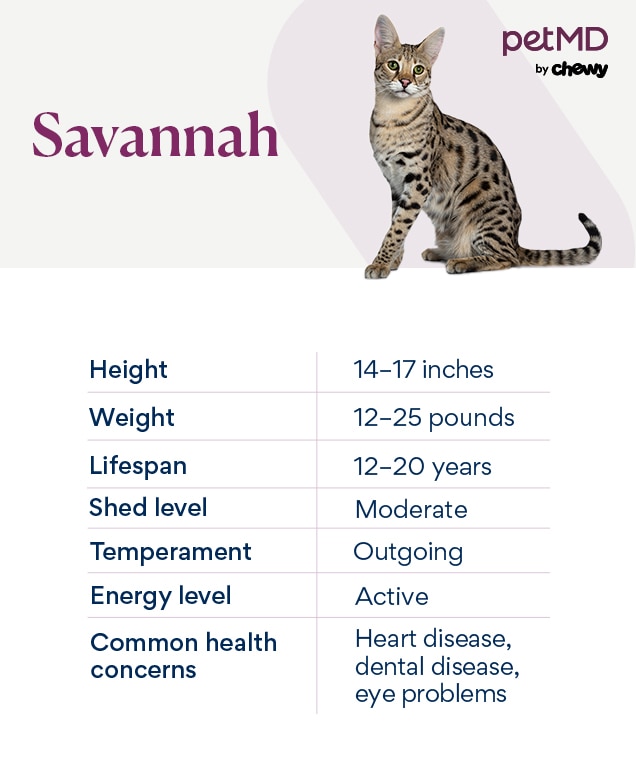
“Savannah Cat Breed Health and Care | PetMD” from www.petmd.com and used with no modifications.
Do Savannah cats need a lot of exercise?
Yes, Savannah cats are highly energetic and require regular exercise to stay healthy and happy. Daily play sessions with toys, interactive games, and opportunities for climbing and exploring are essential to meet their activity needs. Consider teaching them to walk on a leash for outdoor adventures. If you’re curious about other unique cat breeds, you might want to explore the Lykoi wolf cat and their exercise needs.
How often should I take my Savannah cat to the vet?
Regular veterinary check-ups are crucial for maintaining your Savannah cat’s health. Annual visits are recommended for routine examinations and vaccinations. However, if you notice any changes in behavior or health, it’s important to consult your vet promptly. For those interested in learning about other pets, check out the Giant Chinchilla Rabbit adoption guide for more insights on pet care.
Can Savannah cats be left alone during the day?
While Savannah cats can be left alone, they prefer companionship and can become bored if left for long periods. Providing plenty of toys and enrichment activities can help keep them occupied. If possible, consider having a pet sitter or friend check in on them during the day to provide some interaction.
In conclusion, adopting a Savannah cat can be a rewarding experience for those prepared to meet their unique needs. By understanding their behavior, legalities, and care requirements, you can create a happy and healthy environment for your new feline friend.


